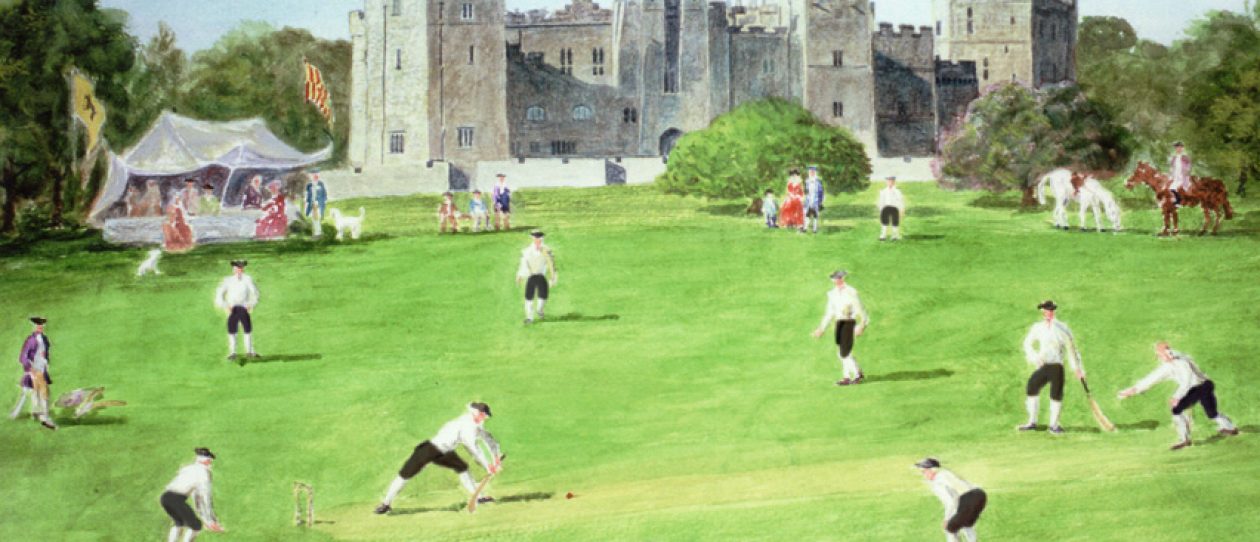OMINOUS WAR CLOUDS predicted Newcastle Journal. Spring 1909. A new season beckoned. The Bishop of Newcastle was about to open a bazaar. The headline triggered a metaphor for his sermon. “In Life we have to pass through vicissitudes. The man who takes up the game of cricket and becomes proficient in it, becomes proficient in that which is extremely useful for this purpose. We do not always have our innings in life. Those who have their innings, at times, give way to others; and it is only by the exercise of patience, endurance and skill – I might add cheerfulness – that they get another innings to follow.”
Fifteen miles away boys at Durham School were at the nets. Focussed solely upon the first innings of summer. They began wonderfully well with an opening stand of 111. W.E.Maynard (223) and B.S.Cumberledge (140) raised the total to 424 for 1. Peter Gedge captured five victims to crush Northumberland Fusiliers for 60. The season proceeded serenely. Cumberledge and Maynard passed 500 runs; Maynard’s 15-year-old brother, Alfred, made 275.
Blaydon’s ground on the banks of the Tyne often became waterlogged so they moved uphill to Denefield in 1913. Durham Light Infantry were first visitors. A new flag flapped above green military tunics surrounding the field. Far away in the Balkans sabre-rattling was heard. Somewhere beyond the boundary, sickle in hand, the Grim Reaper cast a shadow over the occasion. War was about to call ‘Time’ for two men in white. Fred Lennox caught Lieutenant Bettison off a skier. For a moment batsman and fielder were unified in suspense as they gazed at the heavenly orb. Were they able to look into the future they would have seen, not a red ball, but a spinning world dripping with their blood.
Charlie Adamson made a heroic 109 out of 134 against South Shields in May 1914 before national duty called halt to his season. His place was taken by Cambridge graduate Alfred Frederick Maynard whose 119 against Chester-le-Street was said to be one of the best witnessed at Durham City. Bill Rothery could not repeat his wonderful form of 1913 but still headed the DSL batting.
Many had enlisted when war was declared on 4 August. Thousands more, including 267 Wearmouth members, answered Kitchener’s appeal for volunteers. The War Office requisitioned North Durham’s field and others. Clubs soon found it impossible to raise teams. West Hartlepool bat Theo Jones was one of the first civilians killed on home soil when the town was raided. Then the carnage. Millions fell facing rapid-fire weaponry. The brunt of battle was borne by junior officers drawn from public school and university. Durham School’s class of 1909 contemplated a life of fulfilment laced with halcyon days on a cricket field. In reality they lived a nightmare of war bandaged by terrifying days on a battle field. Lieut. P.Gedge, killed in action in 1915; Lieut. A.F.Maynard, killed in action, 1916; Capt. C.Y.Adamson, killed in action, 1918; Lieut. Bettison, killed in action, 1916; Lieut. F. Lennox, killed in action, 1918; J.W.Rothery, died 1919 from injuries received while on active service; Capt. W.E.Maynard, died 1928 from injuries received while on active service. There were others…..
Gentleman farmer and stylish left-hander Tommy Bradford hit 17 sixes in an undefeated 207 as Chester-le-Street ran up 309 for 2 in only 90 minutes. It was one of the great pre-war innings. He and three brothers, ‘The Fighting Bradfords’, answered the call to arms. Two earned a Victoria Cross. Captain T.A.Bradford, DSO, was the lone survivor. War wounds put an end to his cricket.
“This very grave crisis has silenced our spirits in cricket.” The tone of South Shields’ annual report was echoed nation-wide. Major leagues were suspended. Clubs donated their credit balance to War Relief Funds. Those not on military duty played friendly matches. It raised an ethical dilemma. W.G.Grace was one of many who thought it immoral to play cricket while kith and kin were slaughtered abroad. Others believed it had no affect upon military recruitment; anything that raised spirits was welcome. The latter view prevailed when it was clear the war would not “be over by Christmas”. No such dilemma at the battle front :
Had a cricket match on Saturday – our fifth. We get no practice and use our opponents gear. Horses, mules, baggage waggons, ambulance waggons form the boundary line. The guns booming, four or five aeroplanes overhead, and anti-aircraft shells bursting, all form a grand setting for a cricket match.[1]
Club guardians faced major difficulties. Grounds had to be maintained, rent and rates paid. With no income, debts rose steadily. Beresford Horsley gave £50 towards West Hartlepool’s debts of £384. Brother Matthew, now Alderman Horsley, gave £100 and took over the ground mortgage free of interest . Burnhopeside was ploughed up for food production. Stockton allotment holders usurped a patch of Grangefield to grow cabbages and potatoes. Myopic Alf Morris played all over the county to raise funds for bereaved families and food parcels for men at the front. A match at Sacriston financed a field hospital bed in France.
On 11 November 1918 the county awakened to an explosion of sound as freed spirits left the dungeons of war. Flags flew, bonfires burned, fireworks flashed and church bells tolled news of peace. People forgot, for a moment, the silent space where a generation of youth should have stood.
[1] Private Jim Laws (of Beamish) : Letter in 1915 from “somewhere in Belgium”.
